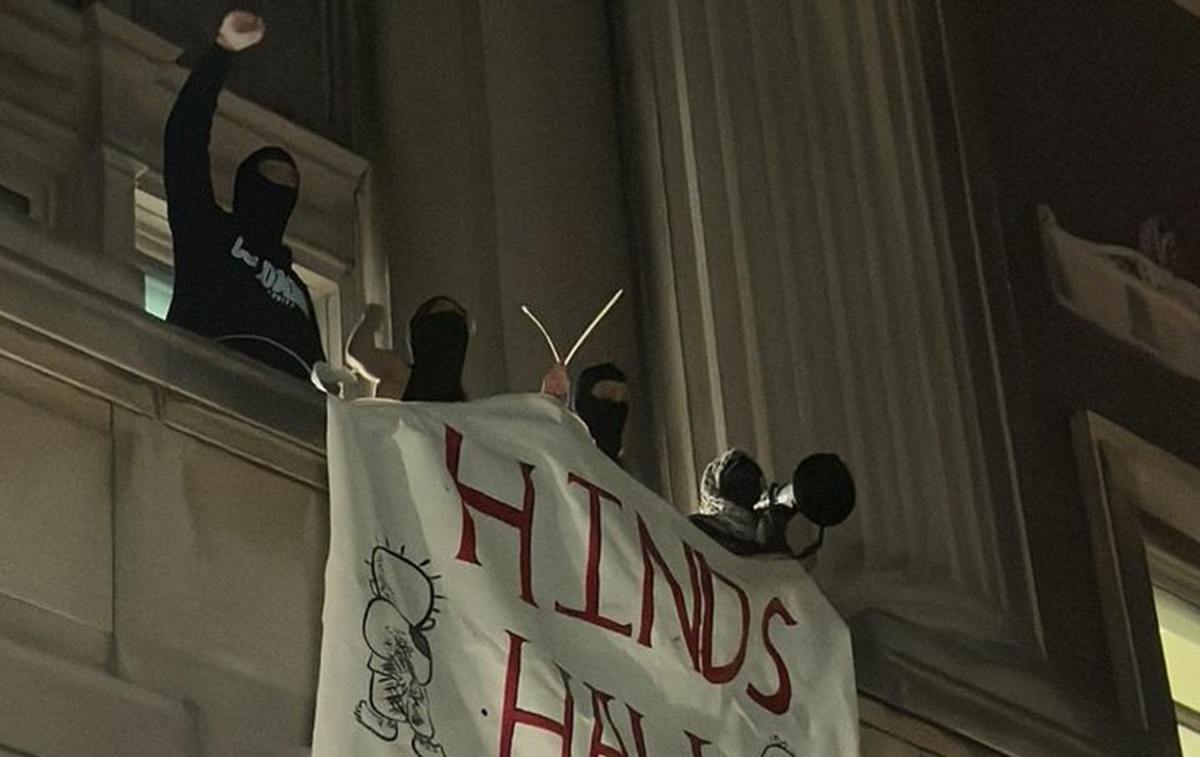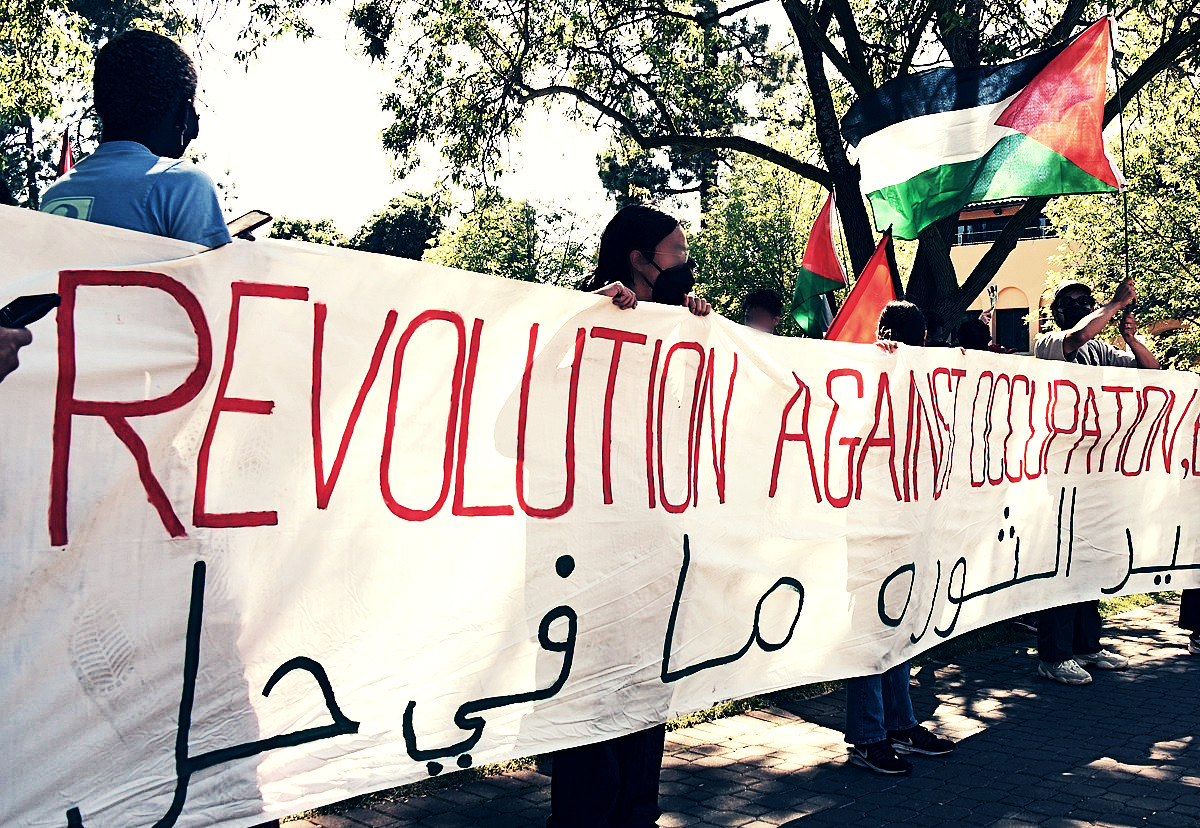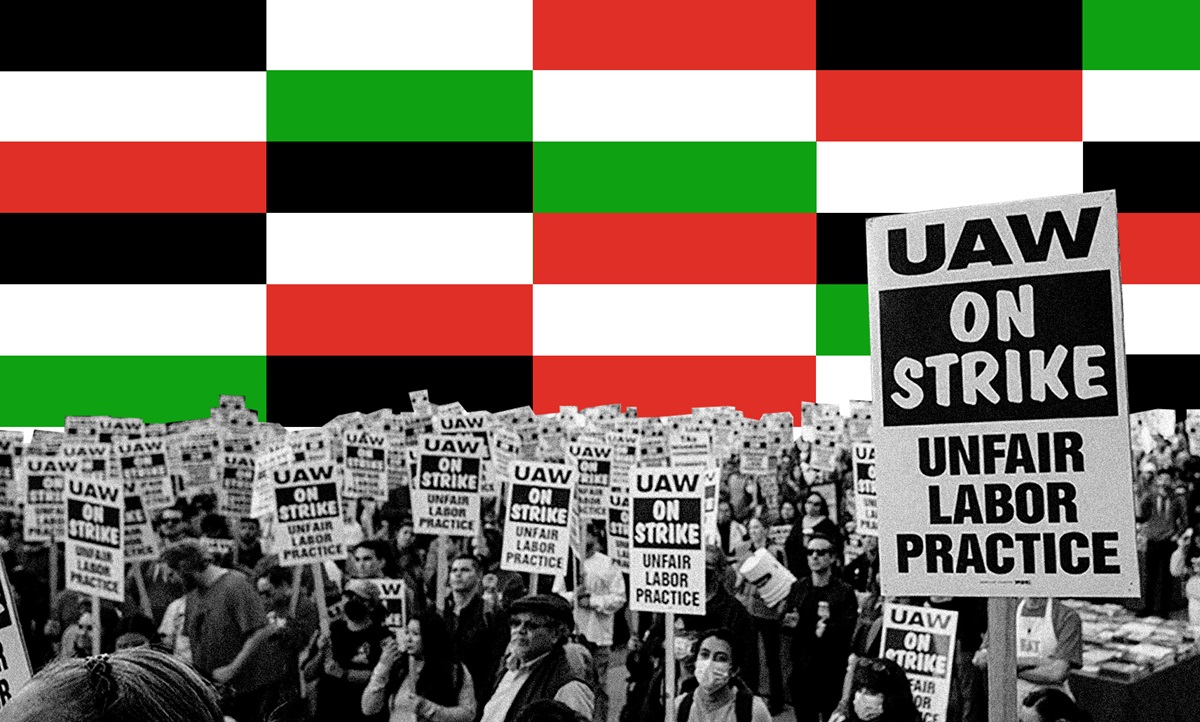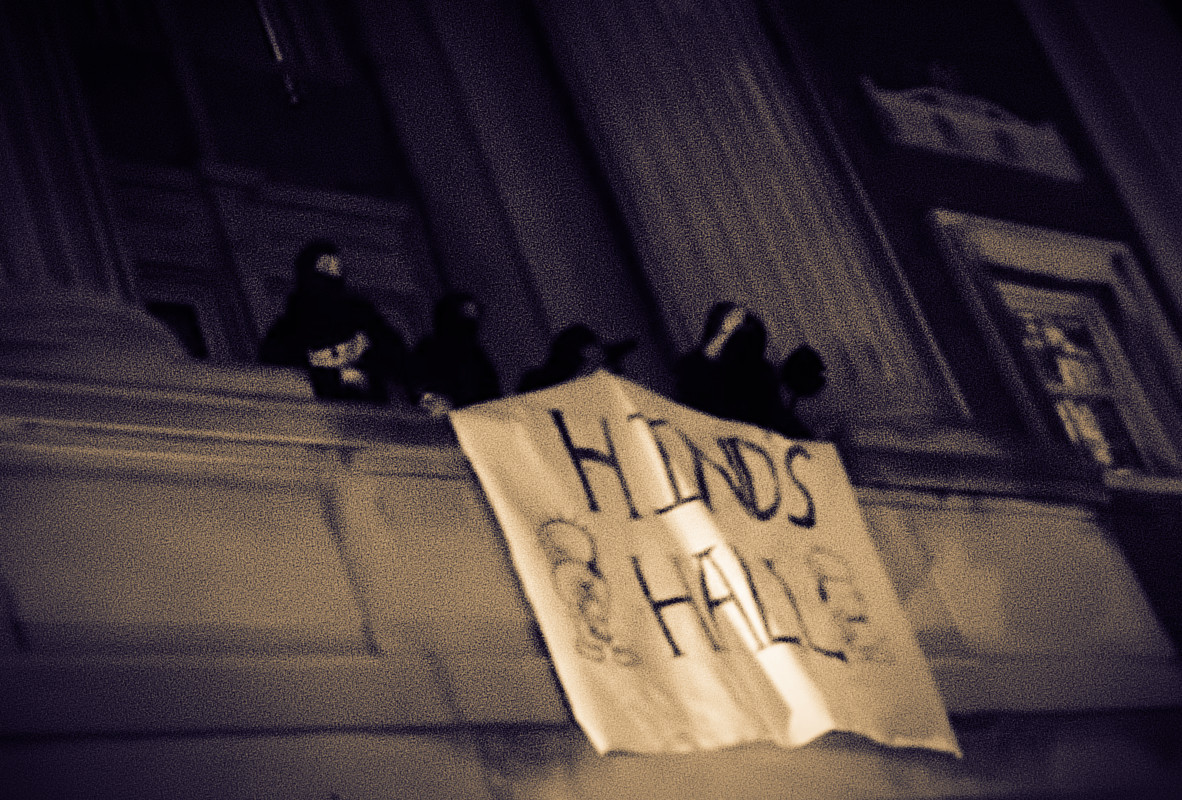Filed under: Analysis, Capitalism, Education

A look at the university as a historical site of conflict and in the current wave of struggle in solidarity with Palestine by IGD contributor Scott Campbell.
As Israel’s brutal genocide against the Palestinian people and Palestine itself continues past the 200-day mark, students around the so-called United States have risen up and are carrying out occupations and erecting encampments on their campuses. These acts are extremely inspiring, militant, and hopeful – calling to mind the campus occupations from the early aughts, the student mobilizing against the war on Vietnam in the 1960s and protests against apartheid in South Africa in the 1980s. Breathless blather from politicians and the media have turned what are actions against genocide into a “controversy” that deftly manages to ignore the political content of what is currently unfolding across the country. As Samuel P. Catlin notes in his exceptional essay, “The Campus Does Not Exist”:
Campus panic is a sustained note in the American public conversation; from Vietnam to Gaza, it has never let up. Reliably, every few months something happens “on campus” that the media inflates to the status of a national emergency: a speaker is invited, a speaker is disinvited, a speaker is not disinvited, a professor teaches, a student complains, a protest takes place. The media offers these incidents as scandals so fascinating and disturbing that they eclipse even a genocide.
At the front of any conversation regarding what is happening on college campuses must be an acknowledgement of what the action is in response to: an ongoing, U.S.-facilitated genocide. It seems both absurd and necessary to note that what matters above all is the genocide. Students (and some faculty and staff) are taking tangible, direct action to pressure institutions complicit in the genocide into divesting and disassociating from that most atrocious of acts. That opposition to genocide has been successfully constructed as “controversial” in this country merely demonstrates the insipid nature of what passes for public discourse and the paucity of thought contained within it.
Nonetheless, Palestine is not a single-issue cause but rather one intrinsically situated within structures, assemblages, and struggles against settler colonialism, imperialism, racism, patriarchy, capitalism, cisheteronormativity, and more. While ignored more often than not, students have keenly identified this fact, such as those at Harvard who announced:
Our movement is one part of a tapestry of liberation movements…By creating this Liberated Zone, we hope to begin the work of building the world we want to inhabit: a world free of the shackles of colonialism…We are driven by the belief that a better world is possible: a world free of racism, white supremacy, cishetero-patriarchy, ableism, antisemitism, Islamophobia, and all forms of hatred. It is for this reason that we are compelled to take action.
Or at Emory University:
We are students across multiple Atlanta universities and community members organizing against Cop City and the genocide of Palestinians at the hands of U.S. imperialism. We are demanding total institutional divestment from Israeli apartheid and Cop City at all Atlanta colleges and universities…This local resistance is a vivid tableau of a global struggle for liberation. At its core, the fight against Cop City is interconnected with global movements against oppressive state practices, most notably the Palestinian struggle for liberation from illegal occupation, apartheid, and systemic violence. The parallels extend deeper into the mechanisms of oppression, where the tactics employed to suppress dissent in Atlanta echo those used globally, facilitated by significant international collaboration in policing and surveillance.
Within the context of this broader struggle, students are using their positionality to manifest the rejection of not only genocide, but the status quo, and positing visions of worlds otherwise. The actions and their articulations can be understood as “theoretical acts,” as interpreted by José Revueltas:
Let us understand here the theoretical act as the encounter of those kinds of ideas that, upon entering into contact with a given reality, have the virtue of stirring up – of disrupting – its deepest layers. Such ideas don’t necessarily have to be theoretical. What constitutes the theoretical act, the profoundly theoretical action, is the stripping, the upsetting of internal reality…Now, this act, action, or, in terms of its most elevated dimension, theoretical movement, is precisely what makes history. [1]
Revueltas was writing in the context of the 1968 student movement in Mexico, which saw students from high schools and universities throughout central Mexico take over campuses and organize mass demonstrations for several months, a movement that would tragically culminate in the Tlatelolco Massacre, when the Mexican army and a paramilitary battalion opened fire on students and workers gathered at the Three Cultures Plaza in Mexico City on October 2, 1968, killing hundreds. As a professor at the National Autonomous University of Mexico (UNAM), Revueltas played an active role in the movement, especially in developing the concept and theory of academic self-management (autogestión académica). While history is never neatly analogous to the present, I believe Revueltas’s analysis and work can offer insights to the struggle currently unfolding on college campuses.
The university is a unique site of conflict. It is a space of both privilege and critique. In a context where other traditional means of struggle, from unions to political parties to civil society organizations are either effectively coopted or repressed, the university remains an environment of contestation. For Revueltas, it was the one part of society where the “crime of integrity and of independence” were permitted. [2] Power in today’s world recognizes this, hence the unleashing of, on the one hand, laws targeting DEI, critical race theory, and so-called “woke culture,” and on the other, calls to send the National Guard onto campus to physically crush the emerging student movement. These attempts to police and forbid thought, ideas, and action demonstrate the fear that questioning and non-conformity inspire among the ruling class.
However, to follow Revueltas’s line of thought, to simply critique is not enough. What must emerge is the practice of self-critique:
Self-management transforms the centers of higher education into the self-critical part of society. That is to say, if higher education previously only carried out a critical role, now, through self-management, it will carry out a transformative and revolutionary role. Critique represents a parallel action directed from the outside, towards society, without any commitment, as a simple definition, as an inert classification, in the same way a phenomenon of nature is defined or classified. Self-management, however, questions society from the inside, as the part of it that it is, and that, in such a state, it becomes the self-critical consciousness of said society. This consciousness, as critique, is the negation of a given society (bourgeois or socialist), and as self-critique is the negation of the negation: it subverts said society, it represents the new and implacable struggle against the old. [3]
As indicated in the above quote, the vehicle for self-critique is academic self-management. The practice of academic self-management may seem to be outside the scope of the current protests, but I believe that in the form they are taking reside the kernels of the practice of self-management. I offer these thoughts not as a prescription but as a contribution to the unfolding struggle.
Academic self-management, as formulated by Revueltas, is the taking of control of all aspects of the university by students and faculty, without regard for hierarchy. Through assemblies, these two groups jointly determine a course of study and organize the management of all university affairs. All topics are open to debate and nothing is off limits. It is the ultimate manifestation of academic freedom and university autonomy. “Nothing is definitive, nothing permanent, for academic self-management, everything is questionable within the field of higher education and outside of it. Self-management is the active and living form of militant and critical knowledge.” [4] Through rigorous self-directed study, Revueltas argued, an “organized collective consciousness” will emerge. We can see the beginnings of a spontaneous, yet organized, collective consciousness within the movements on college campuses today: together, students are actively critiquing the university and society at large and taking tangible means to manifest that critique in action.
While not an anarchist, Revueltas’s vision of academic self-management can be understood as libertarian. It is leaderless, non-hierarchical, non-specialized, directly democratic, prefigurative, and assembly-based. It is concerned with self-critical inquiry into the major problems facing society and the formulation of proposals to address them. Within the practice of self-management lies the root of the solution – people coming together without mediation from the state, political parties, or leaders to discuss, examine, and seek to resolve the crises they are facing.
A crucial part of Revueltas’s schema was that the practice of self-management not remain confined to campus. During 1968 in Mexico, students formed brigades to go out into the cities and towns to build connections with labor and civil society. Revueltas envisioned the creation of a popular struggle council, following a spokescouncil model, where organized committees based on factory or industry, geographical location, and educational center, came together to jointly plot out the course of the struggle. In each of these locations, self-management would be practiced, eventually spreading it into all sectors of society, creating a form of decision-making and problem-solving based in federated self-organization.
While perhaps all this seems ambitious in the current moment, my hope is that it will add an additional layer to how this movement is manifesting, what it means, and what its possibilities are. Students today are demonstrating themselves to yet again be at the forefront of our time’s most pressing issues, in this case the genocide of the Palestinian people, and of utilizing their privilege and subjectivity to speak as a voice of self-reflexive consciousness to society as a whole. This is a crucial role with immense potential, as Revueltas notes:
The collective consciousness that represents the human conglomeration of the components of higher education, organized in practical and theoretical self-management, becomes a force of incalculable reach within the general process of critique and transformation of society. The historical purpose of academic self-management is that the experience of it extends to all of society…[5]
May the movement continue to spread, take root, evolve, contest, and transform until Palestine is free, until all are free.
A description of academic self-management by José Revueltas:
What is academic self-management?
1. Academic self-management is, above all and essentially, an awareness.
2. Awareness of what it is to study and to know, not as an abstract exercise at the margins of time and the society that surround us, but as something that is produced within them and as part of us, in relation and reciprocal conditioning.
3. This relation and conditioning do not work by virtue of their sole and simple presence, subject to mere spontaneous impulse. They require the impulse of the part that represents the conscious factor of the relation, that is, of the one who studies and knows, whose impulse cannot be but revolutionary, whatever the dominant characteristics of society and our time.
4. A conservative and reactionary society, just as an advanced and progressive society, should always and in all cases condition the revolutionary character of the university consciousness (understood as higher education in general). That is, the consciousness of those who study, learn, and know (in the university and other centers of higher education) should always maintain a critical and dissident relationship with society, whatever its nature.
5. If the university consciousness (the consciousness of universality) of the student body uncritically conforms to the society in which it lives (be it a bourgeois society or a socialist society), it ceases to be an active consciousness, it ceases to have the attribute that defines consciousness itself as revolutionary movement and transformation, to become an immobile mirror of society, it is a negation of all consciousness, the academic appendix of society.
6. Self-management transforms the centers of higher education into the self-critical part of society. That is to say, if higher education previously only carried out a critical role, now, through self-management, it will carry out a transformative and revolutionary role. Critique represents a parallel action directed from the outside, towards society, without any commitment, as a simple definition, as an inert classification, in the same way a phenomenon of nature is defined or classified. Self-management, however, questions society from the inside, as the part of it that it is, and that, in such a state, it becomes the self-critical consciousness of said society. This consciousness, as critique, is the negation of a given society (bourgeois or socialist), and as self-critique is the negation of the negation: it subverts said society, it represents the new and implacable struggle against the old.
7. For the concept of self–management, to know is to transform. It is not only a matter of acquiring a certain conception of the world, but that such a conception, at the same time, acts as a revolutionary displacement of the outdated, of the no-longer current, what is obsolete and refuses to disappear. Self-management proposes a militant knowledge, in all cases dissenting from established values.
8. Self-management socializes and politicizes higher education to the maximum of its ability. It socializes it such that it engages with all the vital problems of the society in which it resides and politicizes it such that this engagement obliges immediate public action.
9. Self-management, based on reasons of principle, from the first moment comes out against the criterion of higher education as a producer of exchange values. This pragmatic and narrow criterion is based on the priority given to the satisfaction of the technological needs of industrial society (both in capitalism and in Stalinized socialist society), with the accompanying denaturalization and dehumanization of knowledge. The most fully dehumanized exchange value created by technological education is the specialist, solely and exclusively destined to form a part of the industrial machinery, absolutely alienated from themself. Self-management presupposes an integral technical education, subordinate to the human values of knowledge, in opposition to the skill and efficacy that constitute the ultimate and only goal of technical learning and training.
10. Self-management immediately proposes a thorough revision of all curricula in the field of higher education, within the concept of a true revolution of prevailing systems.
Ciudad Universitaria, September 11, 1968 [6]
Notes:
[1] Revueltas, José. México 68: juventud y revolución. Mexico City, Ediciones Era, 1978, pg. 151.
[2] Ibid, pg. 50.
[3] Ibid, pg. 103.
[4] Ibid, pg. 310.
[5] Ibid, pg. 311.
[6] Ibid, pg. 107-109.
photo: @OaklandAboSol





